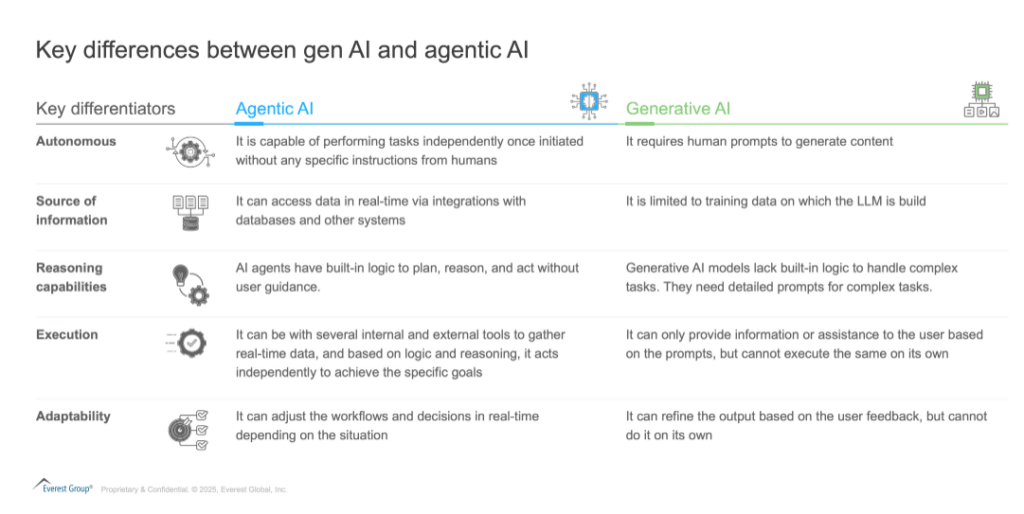
2025 is proving to be a pivotal year for the Business Process Outsourcing (BPO) industry. At one end, there seems to be an exuberance of artificial intelligence (AI), and at the other end, there is noticeable deflationary pressure observed in outsourcing contracts.
Agentic AI, even though it is in its nascent stage, has created more excitement than any other recent technological advancements. Service providers are rushing to announce Agentic AI-powered solutions, especially in Finance & Accounting (F&A) and Human Resources Outsourcing (HRO) areas. How much of it is being driven by Agentic AI as opposed to traditional AI is a question that needs to be asked.
To cut the clutter, it is important to understand the finer details and clear the existing noise first, as we have done below.
What is Agentic AI, and how is it different from generative AI?
Agentic AI refers to artificial intelligence systems that exhibit an agency where they can set goals, make decisions, and take actions autonomously to achieve those goals. These systems are not just reactive tools either, but operate with a degree of independence, autonomy, and adaptability, often coordinating multiple tasks over time
At its core, an AI agent is a virtual assistant designed to act autonomously to achieve specific goals by observing its environment and reasoning based on user input.
These agents also take a proactive approach to attaining their goals, using their reasoning capabilities to determine the next best steps when detailed instructions from the user are not provided.
Key characteristics of Agentic AI:
- Goal-directed behavior: It can achieve goals without specific or no instructions from humans
- Once initiated, it works independently within defined boundaries.
- It can make decisions and adapt according to the situation based on logic and reasoning
- It maintains and uses the memory to improve its performance over a period
- It can perform multi-step workflows or long-term tasks
There is a lot of confusion when it comes to g and agentic AI, and often these terms are used interchangeably. However, there are notable differences in terms of the functionality and capabilities of generative and agentic AI.
Key differences between gen AI and agentic AI

Agentic AI in finance and Human Resources (HR)
Agentic AI in Finance and Human Resources (HR) function is still at an exploration phase with service providers either partnering with their clients to build a workflow or partnering with a technology partner to build a solution. While the impact of Agentic AI will be seen in the entire value chain of F&A and HR, it is predominantly affecting those processes where autonomous actions need to be taken.
It doesn’t rely on fixed rules or scripts. These systems read what’s happening in real time and act on it. If a reconciliation doesn’t line up, they try to fix it. If there’s a variance, they flag it early.
In practice, they stay on top of what’s happening, respond to changes quickly, and reduce the back-and-forth that finance and HR teams are used to. Moreover, agentic AI, when used for functions like financial close or recruitment, helps teams move faster, with fewer errors, and more time to focus on decisions that matter.
Use cases of Agentic AI in F&A
- Procure to pay – In invoice processing workflow, AI agents can automate and reduce exception handling time through AI/ML enabled exception prediction which can look for proactive resolution and approvals. For example – For the exceptions arising because of wrong coding, AI agents can look at history, cost code mapping rules and suggest the right cost code. In procurement, multiple AI agents navigate and interact with third party tools to manage the procurement lifecycle, including demand forecasting, market research, supplier identification and qualification, Request for Proposal (RFP) generation, bid evaluation, contract generation, and performance monitoring.
- Order to cash – AI agents streamline resolutions of invoice disputes through real-time data analysis, anomaly detection, and automated communications while employees handle complex dispute negotiations and manage relationships with customers
- Record to report – AI agents can increase efficiency of matching accounting records line by line. They can also support financial close process, by streamlining journal postings, catching exceptions early on and send them for review and approval
Use cases of Agentic AI in HR
- Recruitment – Multiple AI agents digest data and learn, assisting the talent acquisition lifecycle from forecasting demand to onboarding. Using insights from AI agents, HR professionals develop the talent acquisition strategy, define complex role requirements, conduct in-depth interviews, manage the offer process and negotiations, and design and implement onboarding programs
- Payroll – AI Agents help HR teams save time and labor by quickly handling complex scenarios like tax adjustments, overtime calculations, loss of pay deductions, or benefits deductions with minimal HR intervention. These HR AI Agents help HR teams detect discrepancies in payroll and send alerts ahead of time to address issues before they escalate. They also continuously learn and track news to update any changes in tax laws and policies, ensuring that payrolls are processed with compliance and accuracy
- HR helpdesk – AI agents can automate the chat resolution workflow with minimal human intervention. Based on the criticality and complexity of the issue, they can take a decision to escalate it to a human agent or provide appropriate resolution
- Offboarding – AI agents can work without human intervention to carry out offboarding tasks such as revoking system access, tracking asset return, taking exit interviews and recording the feedback in the system. They reduce the risk since they can revoke the access instantly (depending on employee designation and profile, they can determine what all access they have)
Pricing models in Agentic AI
Since Agentic AI is still in a nascent stage, service providers are experimenting with multiple pricing models to charge for Agentic AI based solutions. Given some of the uncertainties involved in pricing Agentic AI in its current state, service providers have been observed to be cautious and conservative in benefit commitments. Hence, in most of the contracts, we are observing the Agentic AI solution fees built into overall transformation fees without any finer details on actual component-based prices.
But, with evolving maturity and client demanding more transparency, we are seeing 4 prominent pricing models for Agentic AI solutions:
- Cost plus pricing – Service providers charge by detailing tokens, compute or storage used for completing a particular activity and adding some margin on top of that
- Result-based pricing – Seen in very few contracts, this model focuses on results, and the customer is charged only when an outcome is achieved
- Workflow-based pricing – This resembles output-based pricing in which service providers charge by completion of respective workflows
- Per AI-agent – Service providers are charging AI agents like human agents and giving per hour or per year rate cards
Challenges with Agentic AI –
While agentic AI has the potential to change the service delivery landscape for IT and BPO functions, it comes with its own set of challenges. Before implementing any agentic AI, enterprises should also watch out for some of these risks and challenges and tread carefully:
- Since these agents act autonomously, their behavior can be difficult to predict, which makes human alignment crucial
- If not implemented correctly, these models can be manipulated which can increase the risk of cyberattacks and data breaches
- If the technology is implemented on a scale, it can disrupt a large chunk of the workforce
- We still do not have clear guidelines and a regulatory framework in place for AI autonomy and accountability of its action
A robust governance framework is essential for agentic AI to ensure its actions align with organizational strategy and ethical standards. Well-defined policies around accountability and transparency are key to making AI decisions explainable, responsible, and subject to human oversight.
With rapid advancements, Agentic AI is poised to become a mainstream component of Finance & Accounting and Human Resources contracts within the next three years.
Technology is evolving quickly, and its integration into business operations is steadily moving from experimental to essential. If you are looking to gain insights into how your peers are deploying Agentic AI in F&A and HRO contracts, feel free to contact us.
If you found this blog interesting, check out our Agentic AI In CXM: Early Signals On What It Is And What It Is Not | Blog – Everest Group, which delves deeper into another topic regarding Agentic AI.
If you have any questions or want to discuss the evolution of Agentic AI in more depth, please contact Abbas Bagwala ([email protected]) and Arpit Jhaver ([email protected]).







